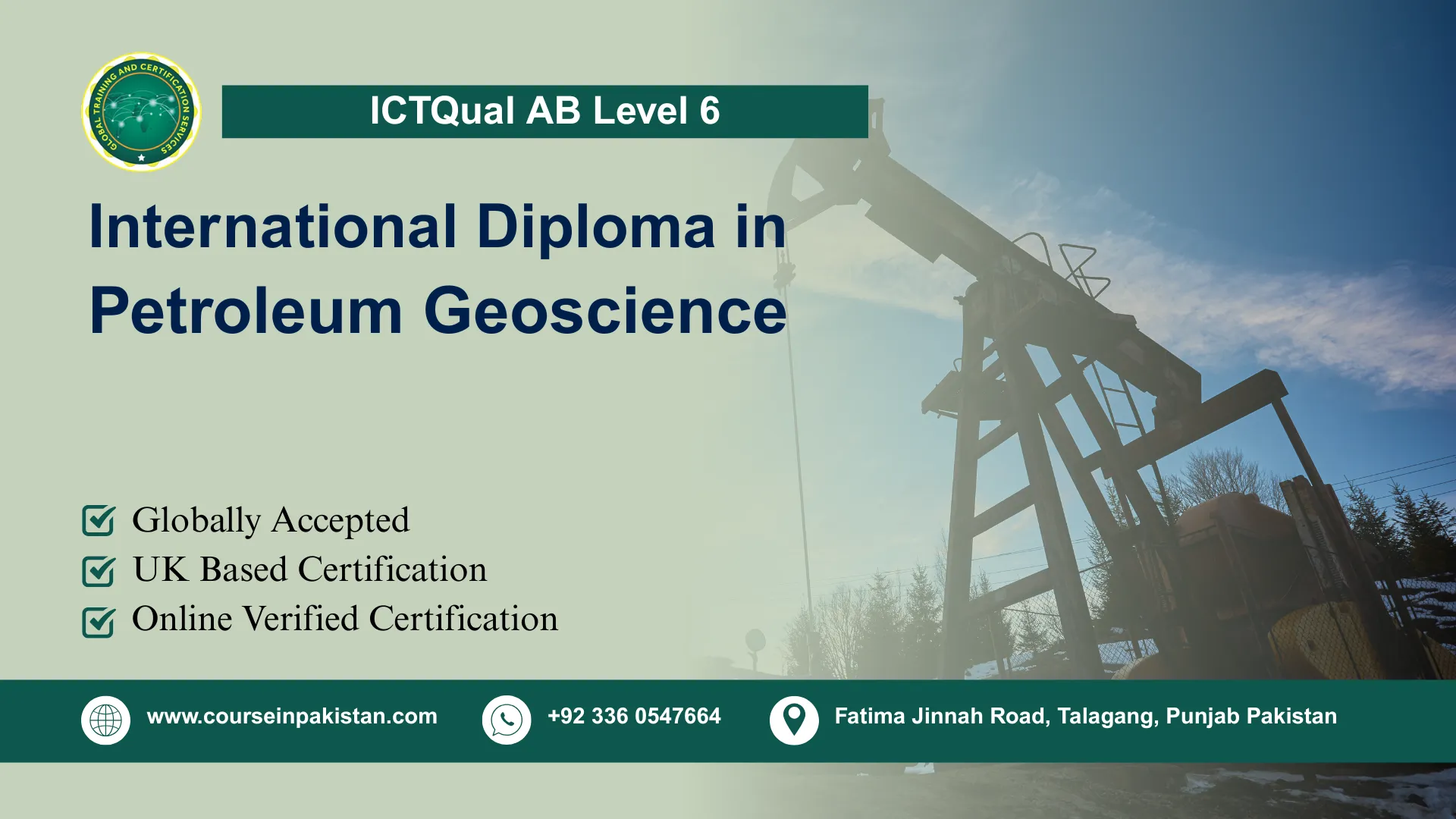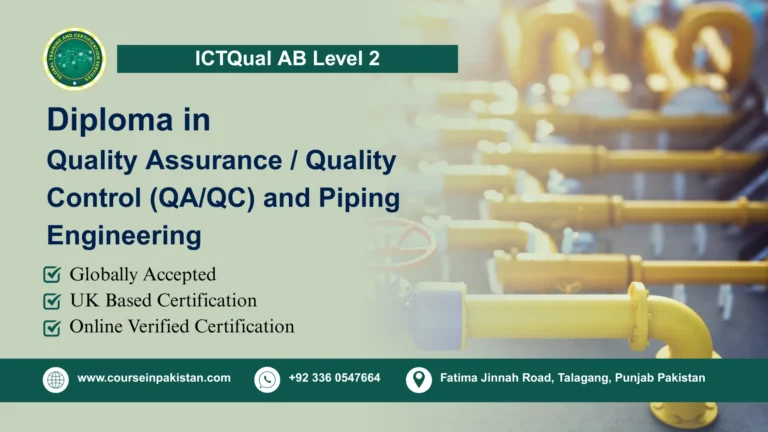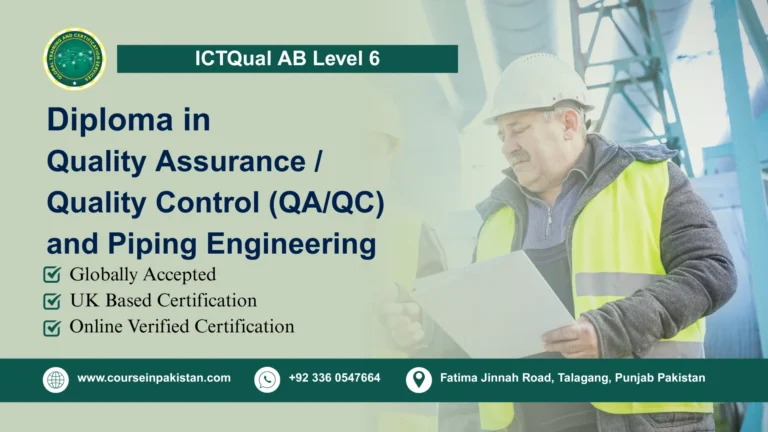
This diploma also emphasizes practical application and industry relevance, combining theoretical knowledge with case studies, fieldwork, and advanced software tools. Graduates will gain the ability to analyze complex geological data, make informed decisions for exploration and production, and contribute to sustainable and efficient petroleum resource management. The program prepares learners for technical, analytical, and strategic roles within global energy and petroleum sectors
The ICTQual AB Level 6 International Diploma in Petroleum Geoscience is designed to equip learners with advanced knowledge and practical expertise in the study of petroleum systems, exploration methods, and reservoir evaluation. The program focuses on integrating geoscientific principles with petroleum engineering concepts, enabling students to understand subsurface geology, hydrocarbon formation, and resource assessment. Learners develop critical skills in seismic interpretation, geological modeling, and reservoir characterization, preparing them for careers in upstream oil and gas operations.
Course Overview
The ICTQual AB Level 6 International Diploma in Petroleum Geoscience is a globally recognized qualification designed to provide learners with advanced knowledge and practical skills in petroleum exploration, geoscience analysis, reservoir evaluation, and energy resource management. This 360-credit, fully assignment-based diploma allows learners to study at their own pace from anywhere in the world. It is British Council verificable and MOFA and Embassy attestable, making it highly suitable for employment, career advancement, and iqama approval. The course covers key topics including geological surveying, petrophysics, reservoir characterization, seismic interpretation, and petroleum system analysis, preparing learners to apply scientific and technical methods in the exploration and production of petroleum resources.
This qualification is suitable for both fresh learners and experienced professionals. Fresh students are required to complete all 36 mandatory assignments within three years, while experienced and competent individuals with at least six years of relevant experience can complete the certification in a shorter time by submitting verifiable experience and defending their knowledge in professional discussion meetings with an ICTQual AB approved assessor, without completing all mandatory assignments. By the end of the program, learners will have developed the technical expertise, analytical skills, and strategic understanding required to take on senior roles in petroleum geoscience, reservoir management, and exploration projects, ensuring career growth and professional recognition both locally and internationally.
Key Highlights of the Course:
- Advanced training in petroleum geoscience, reservoir evaluation, and exploration techniques
- Practical experience with seismic interpretation, geological modeling, and well log analysis
- Emphasis on health, safety, environmental awareness, and sustainable resource management
- Prepares learners for technical, analytical, and leadership roles in oil and gas operations
- Globally recognized qualification aligned with international industry standards
Course Benefits
Develop Expertise in Petroleum Geoscience
- Gain advanced skills in reservoir characterization, hydrocarbon assessment, and subsurface analysis
- Learn to apply geoscience principles to optimize exploration and production
Enhance Analytical and Technical Skills
- Master seismic interpretation, well log analysis, and geological modeling techniques
- Apply data-driven approaches to evaluate hydrocarbon potential and make informed decisions
Expand Career Opportunities
- Prepare for roles such as Petroleum Geoscientist, Reservoir Analyst, Exploration Geologist, or Energy Consultant
- Enhance employability in national and international oil and gas companies
Leadership and Strategic Skills
- Develop project management, problem-solving, and decision-making abilities
- Learn to lead multidisciplinary teams and manage exploration and production projects
Course Study Units
This qualification, the ICTQual AB Level 6 International Diploma in Petroleum Geoscience, consists of 36 mandatory units.
Year 1 – Foundation in Petroleum Geoscience
- Principles of Geology and Earth Sciences
- Introduction to Petroleum Exploration
- Mineralogy and Petrology
- Sedimentology and Stratigraphy
- Geophysical Methods in Exploration
- Introduction to Reservoir Engineering
- Drilling Operations Fundamentals
- Petroleum Fluid Properties
- Geoscience Data Collection Techniques
- Health, Safety, and Environmental Awareness
- Scientific Report Writing
- Introduction to Geospatial Technology
Year 2 – Intermediate Petroleum Geoscience
- Structural Geology and Tectonics
- Advanced Sedimentary Basin Analysis
- Reservoir Characterisation and Modelling
- Petrophysics and Well Logging
- Seismic Interpretation and Geophysics
- Drilling Fluid and Wellbore Stability
- Production Systems and Flow Mechanics
- Hydrocarbon Exploration Techniques
- Risk Assessment and Project Management
- Environmental Impact and Sustainability
- GIS Applications in Petroleum Geoscience
- Technical Communication and Data Analysis
Year 3 – Advanced Petroleum Geoscience
- Advanced Reservoir Simulation
- Enhanced Oil Recovery Techniques
- Petroleum Economics and Project Evaluation
- Exploration Strategy and Field Development
- Advanced Geophysics and Seismic Modelling
- Subsurface Fluid Flow and Reservoir Dynamics
- Drilling Design and Well Planning
- Petroleum Laboratory Techniques
- Energy Transition and Sustainable Practices
- Research Methods in Geoscience
- Capstone Project in Petroleum Geoscience
- Professional Development and Leadership in Energy
Learning Outcomes
Year 1 – Foundation in Petroleum Geoscience
Principles of Geology and Earth Sciences
- Understand core concepts of geology, earth processes, and their relevance to petroleum systems
- Apply basic geological principles to analyze subsurface formations
Introduction to Petroleum Exploration
- Comprehend stages and methods of petroleum exploration
- Evaluate exploration data to identify potential hydrocarbon sites
Mineralogy and Petrology
- Identify and classify minerals and rocks relevant to petroleum geology
- Apply petrological knowledge to support exploration and reservoir studies
Sedimentology and Stratigraphy
- Analyze sedimentary formations and stratigraphic sequences
- Apply stratigraphic principles to understand reservoir distribution
Geophysical Methods in Exploration
- Understand geophysical survey techniques used in petroleum exploration
- Interpret basic geophysical data for subsurface evaluation
Introduction to Reservoir Engineering
- Understand fundamental principles of reservoir behavior and fluid flow
- Apply basic concepts to support reservoir analysis and production planning
Drilling Operations Fundamentals
- Describe drilling operations, rig components, and workflows
- Apply knowledge of drilling fundamentals to exploration projects
Petroleum Fluid Properties
- Understand physical and chemical properties of oil, gas, and water
- Apply fluid property data to reservoir and production evaluations
Geoscience Data Collection Techniques
- Collect, record, and interpret geological and geophysical data
- Ensure accuracy and reliability of data for exploration analysis
Health, Safety, and Environmental Awareness
- Understand key safety, environmental, and regulatory requirements in petroleum projects
- Apply safe practices to exploration and drilling activities
Scientific Report Writing
- Prepare clear, structured scientific and technical reports
- Communicate findings effectively to stakeholders
Introduction to Geospatial Technology
- Understand GIS and geospatial tools in petroleum exploration
- Apply geospatial technology to analyze and visualize subsurface data
Year 2 – Intermediate Petroleum Geoscience
Structural Geology and Tectonics
- Analyze structural features and tectonic settings affecting petroleum reservoirs
- Apply structural geology principles to exploration and drilling planning
Advanced Sedimentary Basin Analysis
- Evaluate sedimentary basin formation and hydrocarbon potential
- Apply basin analysis techniques for exploration strategy
Reservoir Characterisation and Modelling
- Develop 3D reservoir models using geological and petrophysical data
- Evaluate reservoir heterogeneity and flow properties
Petrophysics and Well Logging
- Interpret well log data for lithology, porosity, and fluid saturation
- Apply petrophysical analysis to reservoir evaluation
Seismic Interpretation and Geophysics
- Analyze seismic data to delineate subsurface structures
- Integrate geophysical data into exploration and reservoir assessment
Drilling Fluid and Wellbore Stability
- Understand drilling fluid design and its role in wellbore stability
- Apply techniques to prevent wellbore collapse or fluid loss
Production Systems and Flow Mechanics
- Analyze fluid flow in reservoirs and production systems
- Apply flow mechanics principles to optimize production
Hydrocarbon Exploration Techniques
- Evaluate and apply advanced exploration methods for oil and gas
- Design exploration programs using integrated geoscience approaches
Risk Assessment and Project Management
- Conduct risk analysis and implement mitigation strategies in exploration projects
- Apply project management principles to petroleum operations
Environmental Impact and Sustainability
- Assess environmental impacts of exploration and production
- Implement sustainable practices and compliance measures
GIS Applications in Petroleum Geoscience
- Use GIS tools to analyze, model, and visualize geoscientific data
- Integrate spatial data into exploration and reservoir planning
Technical Communication and Data Analysis
- Interpret complex geoscience data and present findings effectively
- Use analytical techniques to support decision-making in petroleum projects
Year 3 – Advanced Petroleum Geoscience
Advanced Reservoir Simulation
- Develop and run reservoir simulation models to predict fluid behavior
- Apply simulation results for production optimization
Enhanced Oil Recovery Techniques
- Evaluate EOR methods and their applicability to different reservoirs
- Design strategies to maximize hydrocarbon recovery
Petroleum Economics and Project Evaluation
- Conduct economic analysis of exploration and production projects
- Evaluate financial feasibility and investment decisions
Exploration Strategy and Field Development
- Formulate exploration plans and field development strategies
- Integrate geological, engineering, and economic data for project planning
Advanced Geophysics and Seismic Modelling
- Apply advanced seismic techniques for subsurface imaging
- Integrate geophysical models into reservoir and exploration planning
Subsurface Fluid Flow and Reservoir Dynamics
- Analyze multiphase fluid flow and dynamic reservoir behavior
- Apply principles to optimize well performance and production
Drilling Design and Well Planning
- Develop drilling plans and well trajectories for exploration and production
- Optimize well design for safety, efficiency, and reservoir access
Petroleum Laboratory Techniques
- Conduct laboratory experiments for rock and fluid analysis
- Interpret lab results to support exploration and reservoir management
Energy Transition and Sustainable Practices
- Understand energy transition trends and sustainable petroleum practices
- Apply strategies to minimize environmental impact and enhance efficiency
Research Methods in Geoscience
- Apply advanced research techniques for petroleum geoscience projects
- Critically analyze data to support exploration, drilling, and reservoir decisions
Capstone Project in Petroleum Geoscience
- Integrate knowledge and skills to complete a comprehensive geoscience project
- Present solutions and recommendations for real-world petroleum challenges
Professional Development and Leadership in Energy
- Develop leadership and career management skills in petroleum geoscience
- Apply professional ethics and continuous development practices in the energy sector
Who is This Course For?
Aspiring Petroleum Geoscientists
- Individuals aiming to build careers in petroleum exploration, reservoir characterization, and subsurface analysis
- Learners seeking advanced technical expertise in hydrocarbon assessment and field development
Industry Professionals
- Professionals currently working in oil, gas, or energy sectors who want to upskill
- Individuals aiming to transition into technical, analytical, or leadership roles in petroleum geoscience
Graduates in Related Fields
- Students with backgrounds in geology, earth sciences, petroleum, or chemical engineering
- Learners seeking internationally recognized qualifications to enhance employability and career progression
Analytical and Research-Oriented Learners
- Individuals who enjoy data interpretation, modeling, and problem-solving in geological contexts
- Learners aiming to apply scientific methods to practical exploration and production challenges
Future Progression
- Technical roles such as Petroleum Geoscientist, Reservoir Analyst, Exploration Geologist, or Well Log Analyst
- Leadership or project management positions in exploration, production, or reservoir management
- Opportunities in multinational oil and gas companies, consultancy firms, and energy research organizations
- Pathways to advanced technical roles in reservoir simulation, field development, or energy transition projects
- Opportunities for postgraduate studies such as MSc in Petroleum Geoscience, Reservoir Engineering, or Energy Systems
Academic Pathways:
- Master’s programs in Petroleum Geoscience, Petroleum Engineering, or Energy Management
- Postgraduate diplomas in Reservoir Engineering, Exploration Geophysics, or Hydrocarbon Systems
- Professional certifications in well logging, seismic interpretation, or reservoir modeling
- Specialized courses in energy transition, sustainable petroleum practices, or advanced geoscience technologies
Conclusion
The ICTQual AB Level 6 International Diploma in Petroleum Geoscience equips learners with advanced technical, analytical, and leadership skills essential for success in the global oil and gas industry. Graduates are prepared to conduct subsurface analysis, optimize reservoir performance, and contribute to exploration and production strategies while adhering to industry standards and sustainable practices. This program develops highly skilled professionals capable of leading multidisciplinary teams, managing complex projects, and driving innovation in petroleum geoscience operations.






